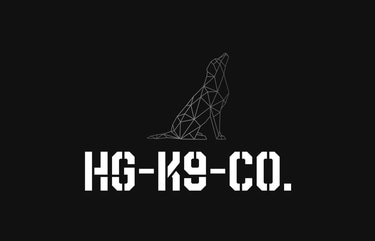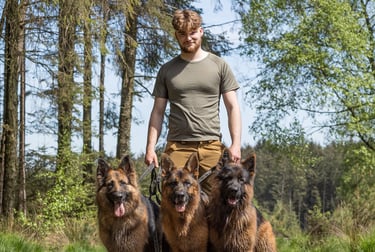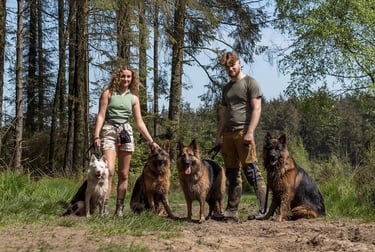How to create an all round great dog.
Written by Jack Smithson, head trainer at HGK9CO, Harrogate K9 Company. Offering Dog Walking & Daycare in Harrogate and Dog & Puppy Training in Harrogate & North Yorkshire.
Introduction: Creating an all-round great dog involves more than just basic training. It requires a holistic approach that includes socialisation with dogs, people, children, and other animals such as livestock and horses. At Harrogate K9 Company (HGK9CO), we believe that a well-socialised dog is a happy and well-behaved companion. Here’s how you can help your dog become a well-rounded member of your family and community.
1. Early Socialisation: Early socialisation is crucial for developing a well-rounded dog. Puppies are particularly receptive to new experiences between the ages of 3 and 14 weeks. During this period, expose your puppy to a variety of sights, sounds, and experiences in a controlled and positive manner.
2. Socialising with Other Dogs: Regular interactions with other dogs are essential for teaching your dog how to communicate and play appropriately. Here are some ways to socialise your dog with other dogs:
Puppy Classes: Enrol your puppy in a well-structured puppy class where they can meet other dogs in a controlled environment.
Dog Parks: Visit dog parks where your dog can run and play with other dogs. Ensure that the park is clean and the dogs are well-behaved.
Playdates: Arrange playdates with friends or neighbours who have friendly dogs. This allows for more controlled and supervised interactions.
3. Socialising with People: Introducing your dog to a variety of people helps them become comfortable around strangers and reduces the risk of fear-based aggression. Here’s how you can do it:
Positive Introductions: Ensure that all interactions with new people are positive. Encourage visitors to give treats and gentle pats.
Public Places: Take your dog to dog-friendly public places such as cafes, parks, and shops. This helps them get used to different environments and types of people.
Training Classes: Enrol in training classes where your dog can interact with different people while learning new skills.
4. Socialising with Children: Children often move, sound, and behave differently from adults, which can be confusing for dogs. Here’s how to help your dog get used to children:
Supervised Interactions: Always supervise interactions between your dog and children, especially if the dog is not familiar with kids.
Positive Experiences: Encourage gentle and positive interactions. Teach children to approach the dog calmly and offer treats.
Gradual Exposure: Gradually expose your dog to children of different ages in various settings, ensuring that each experience is positive.
5. Socialising with Livestock and Horses: For dogs living in rural areas or those that may encounter livestock and horses, it’s important to ensure they are comfortable and behave appropriately around these animals:
Controlled Introductions: Introduce your dog to livestock and horses in a controlled environment. Keep them on a lead and maintain a safe distance initially.
Positive Reinforcement: Reward your dog for calm behaviour around livestock and horses. Use treats and praise to reinforce positive interactions.
Gradual Desensitisation: Gradually decrease the distance between your dog and the animals as your dog becomes more comfortable. Ensure that all interactions remain calm and controlled.
6. Exposure to Various Environments: A well-rounded dog should be comfortable in a variety of environments. Here’s how you can expose your dog to different settings:
Different Surfaces: Walk your dog on different surfaces such as grass, gravel, sand, and pavement to get them used to various textures.
Urban Environments: Expose your dog to urban environments with busy streets, loud noises, and crowds. Gradually increase the exposure to help them acclimate.
Rural Areas: Take your dog to rural areas where they can encounter different smells, sights, and sounds, such as wildlife and farm animals.
7. Consistent Training: Consistent training is key to reinforcing good behaviour and ensuring your dog understands what is expected of them. Use positive reinforcement techniques to teach basic commands and good manners.
Daily Training: Incorporate short training sessions into your daily routine. Consistency is key to effective learning.
Advanced Training: As your dog masters basic commands, introduce more advanced training to keep them mentally stimulated and well-behaved.
Problem Solving: Address any behavioural issues promptly with positive reinforcement techniques and, if necessary, seek professional guidance.
Conclusion: Creating an all-round great dog involves a comprehensive approach to socialisation and training. By exposing your dog to a variety of experiences, people, animals, and environments, you can help them become a well-adjusted and well-behaved companion. At HGK9CO, we are committed to supporting you in this journey with personalised training plans and expert guidance. With patience, consistency, and positive reinforcement, you can create a happy, confident, and all-round great dog.




